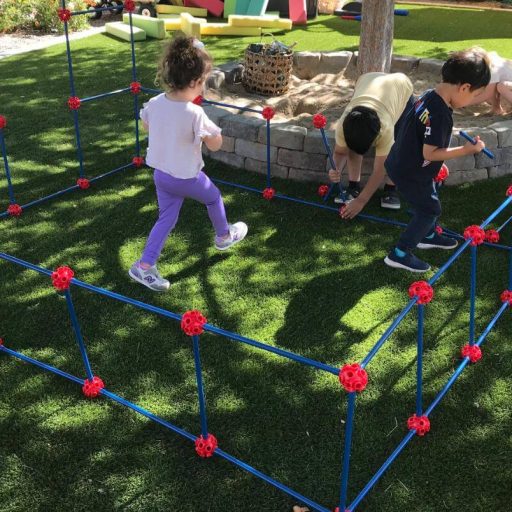
We believe children are curious and competent explorers of the world around them. They are natural-born researchers, thinkers, communicators, and creators. Children are citizens of our communities. They have the right to be respected, trusted, and treated with importance. We understand that each child follows their own unique path of development and reaches their developmental milestones at their own pace. We honor their individual journeys. We believe that the diversity of the children’s personal experiences enrich the preschool community, and us as educators.
We have adopted the Reggio Emilia approach as a guiding framework to create our own interpretation of a learning context based on the participating children and their families’ cultural background.
In this context, we first and foremost observe the children and listen to them. We give them the time to ponder, interpret, and deepen their understanding of themselves and of people in their lives. We honor and cultivate the children’s curiosities and interests at any given stage of their development.
As Reggio-inspired educators, we put a strong emphasis on guiding the children through creating enriching relationships with their teachers, peers, and the environment with which they interact. Most importantly, we believe that children can express their thinking in many ways–which the Reggio Emilia founder, Loris Malaguzzi, so beautifully captured in his poem.
“The child is made of one hundred.
The child has a hundred languages a hundred hands a hundred thoughts a hundred ways of thinking of playing of speaking.
A hundred always a hundred ways of listening of marveling of loving a hundred joys for singing and understanding a hundred worlds to discover a hundred worlds to invent a hundred works to dream.
The child has a hundred languages (and a hundred , hundred, hundred more)but they steal ninety-nine.
The school and the culture separate the head from the body
They tell the child to think without hands to do without head to listen and not to speak to understand without joy to love and to marvel only at Easter and Christmas
They tell the child: to discover the world already there and of the hundred they steal ninety-nine.
They tell the child: that work and play reality and fantasy science and imagination sky and earth reason and dream are things that do not belong together.
And thus they tell the child that the hundred is not there.
The child says.
No way. The hundred is there.”
Loris Malaguzzi
Translated by Leila Gandini
Some people assume that the Italian roots of the Reggio Emilia approach make it similar to the Montessori education. Both philosophies recognize children as active agents of their learning. Both emphasize carefully curated environments in which teachers observe children. However, there are some fundamental differences between the two approaches:
In Montessori preschools: | In Reggio-inspired preschools: |
|---|---|
| The curriculum is recycled annually and students are expected to memorize a prescribed percentage of the content, regardless of a child’s interests. | The curriculum is organic, based on the teachers’ observations of the children and co-constructed with them. It varies with every group. |
| Children are taught how to use learning materials in only one way to accomplish a prescribed procedure, limiting critical thinking and independent learning possibilities. | Children are offered learning materials to discover and experiment with. |
| Children are encouraged to develop skills independently of others. | Children are encouraged to develop skills through group communication and collaboration. |
| Children engage in sequences of isolated activities that are created by teachers. | Children engage in interdisciplinary long-term projects that they co-create with teachers. |
| Mastery of skills is the basis of measuring the child’s growth. | Making deeper connections on the concepts of the project and being able to express one’s thinking in multiple modalities is the basis of measuring the child’s growth. |
| Teachers decide on the learning journeys of the children. | Teachers and children decide on the learning journeys. |
Copyright © 2024 Blossom Family Preschool, All Rights Reserved. Designed by Digital Roots Media | Sitemap | Privacy Policy & Terms of Use